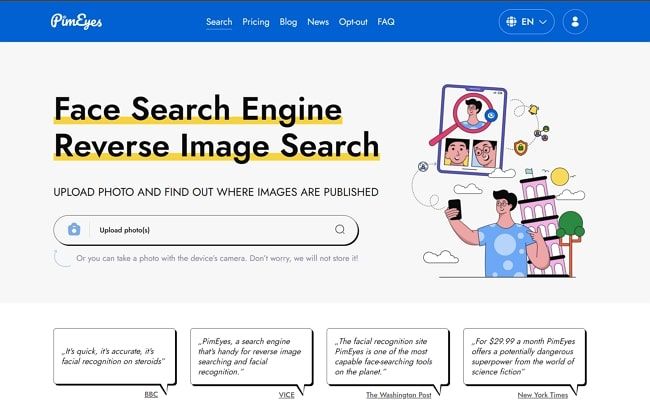2024 Лучшие бесплатные Deepnude AI: AI обнаженные
Ниже представлен список лучших AI-приложений для создания ню, которые стоит проверить!

In an era marked by technological advancements, PimEyes, a prominent facial recognition search engine, is setting new precedents for digital ethics. The company's recent decision to prohibit searches involving minors underscores a growing recognition of the need to protect vulnerable populations online. This development not only represents a significant shift in operational policy but also sparks a broader dialogue about privacy, consent, and ethical responsibility in the digital age.
PimEyes' CEO, Giorgi Gobronidze, has been instrumental in this policy shift, reflecting his commitment to safeguarding individual privacy, particularly for those unable to advocate for themselves. The implementation of technological barriers is part of the company's overarching "no harm policy" and signals a more conscientious approach within the tech industry. This policy change comes at a critical juncture, as facial recognition technology becomes increasingly prevalent, raising serious ethical and privacy concerns.
The service, known for its powerful facial scanning and recognition capabilities, operates on a subscription basis, providing users with tools to perform comprehensive online searches for images matching their faces. PimEyes' database is extensive, containing nearly three billion faces, and processes an average of 118,000 searches daily. These features, while innovative, have necessitated a careful examination of ethical implications, particularly concerning consent and the potential for misuse.
The ambiguity surrounding users' motives for performing searches was a pivotal concern, leading to the recent ban on minor-focused searches. Prior to this, the platform's capabilities, although beneficial for individuals tracking their digital footprints or parents monitoring their children's online presence, were susceptible to exploitation by nefarious actors, including predators or individuals with malevolent intentions.
Addressing these ethical quandaries, Mr. Gobronidze remarked, "The unrestricted access to facial images, especially of minors, is fraught with danger. Despite the service's original intent for self-search and security, the potential for harm by morally corrupt individuals cannot be ignored." Consequently, PimEyes took corrective action, disabling hundreds of accounts associated with inappropriate searches and re-evaluating their platform's accessibility.
The decision to restrict access to minors' images was not impulsive. It was a carefully considered action influenced by broader societal and industry trends. The urgency of this issue was further highlighted by investigative journalism, such as the insightful New York Times piece exploring the darker side of A.I. and digital exposure affecting children. The publication brought to light the unintended consequences of such technologies, hastening PimEyes' response.
However, the journey toward full-proof digital safety is ongoing. The current technical safeguards, based on age-detection algorithms, have exhibited limitations, particularly concerning adolescents. The system's efficacy diminishes when analyzing faces of teenagers, and recognition accuracy fluctuates based on the photographed subjects' angles and poses. These challenges became evident through various tests, revealing that certain facial orientations could bypass the security measures, allowing unauthorized searches to proceed undetected.

PimEyes is actively working on these shortcomings, committed to enhancing the accuracy and reliability of its protective systems. "We are continually refining our technology," Mr. Gobronidze assured, acknowledging the imperfections and expressing a steadfast commitment to digital safety and ethical responsibility.
However, PimEyes is not the only entity navigating these complex issues. Other facial recognition services, such as FaceCheck.Id, currently do not employ similar protective restrictions, pointing to an industry-wide inconsistency in addressing privacy concerns and ethical dilemmas. This disparity highlights the need for comprehensive standards and regulations governing facial recognition technologies and digital search platforms.
Privacy expert Daniel Solove, a seasoned law professor at George Washington University, emphasized the gravity of the situation beyond just children's online safety. He critiqued the broader operational mechanisms of these facial recognition services, which he argued contribute to "a massive privacy violation on a mammoth scale." According to Solove, these platforms systematically infringe on personal privacy by collecting, analyzing, and enabling the searchability of individuals' facial images without obtaining explicit consent.
The implications of this are far-reaching, affecting adults and minors alike and posing a multitude of risks, from identity theft to unauthorized surveillance and data breaches. Consequently, there is an urgent call for these tech enterprises to reassess their practices and for regulatory bodies to implement stringent guidelines safeguarding individual privacy.
In this complex landscape, PimEyes' policy evolution marks a significant, if initial, step toward a more ethically conscious technological environment. The company's proactive stance paves the way for similar platforms to follow suit, potentially heralding an industry-wide shift toward greater accountability and ethical consideration.
The dialogue surrounding digital ethics, particularly in facial recognition technology, is rapidly evolving. Stakeholders, from tech giants to individual users and regulatory authorities, must engage in constructive discourse, reflecting on current practices and envisioning a framework that upholds ethical integrity, respects privacy, and ensures the digital safety of all internet users, especially vulnerable groups like children.
As the world becomes increasingly interconnected through technology, the balance between innovation and ethical responsibility remains precarious. The decisions made now by companies like PimEyes will shape the digital landscape of the future, potentially defining the norms of privacy, consent, and security in an ever-evolving digital world.